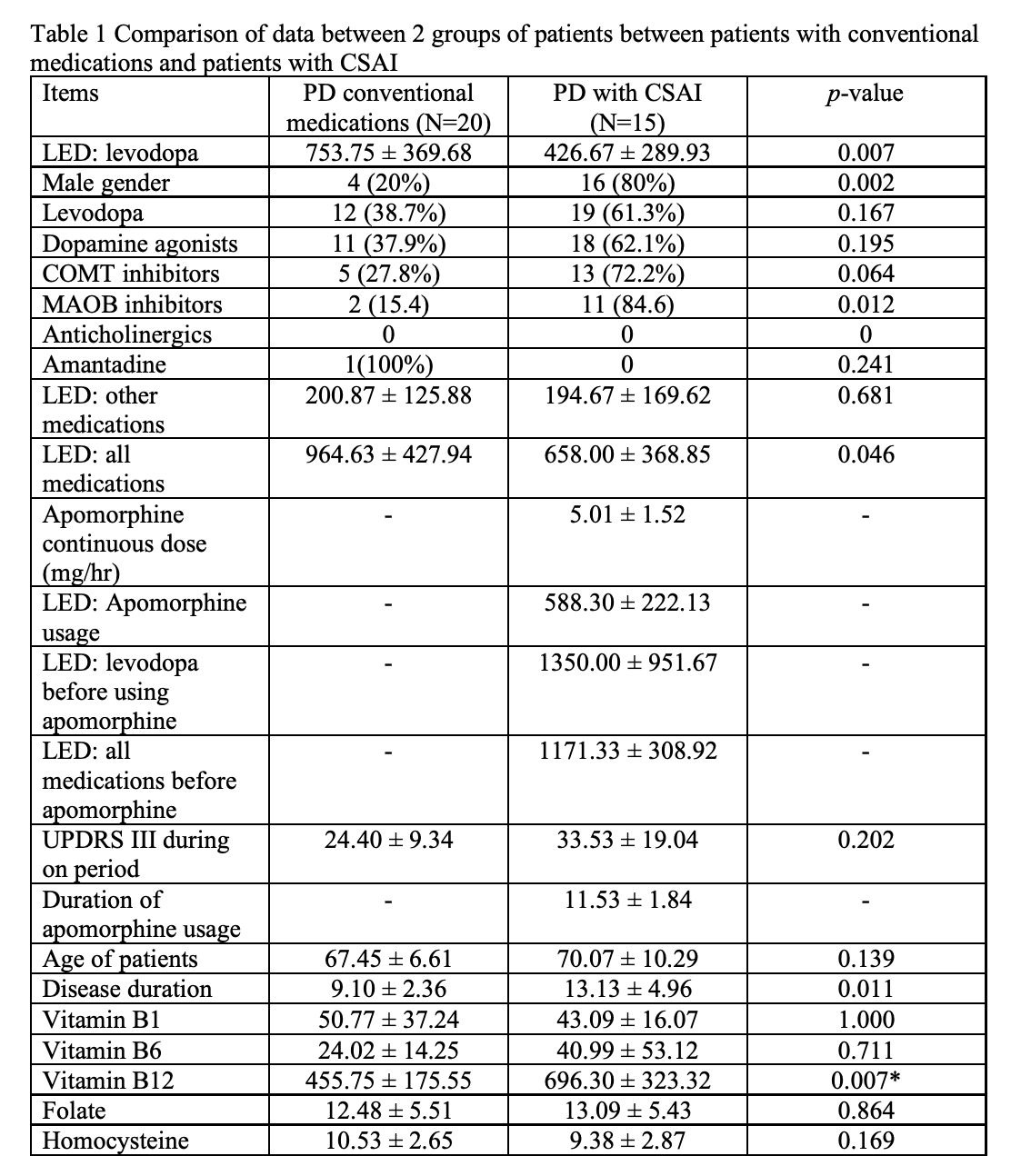Objective: To evaluate the plasma level of vitamin B and homocysteine between PD patients with conventional medications and PD patients with CSAI.
Background: Although levodopa is the mainstay treatment for Parkinson’s disease (PD), exposure to long-term levodopa usage may affect vitamin B and homocysteine metabolism and result in increased plasma homocysteine and decreased vitamin B12 levels. Therefore, long-term levodopa usage may become a potential risk factor for neuropathy, gait instability, and cognitive impairment as a result of increased plasma homocysteine and decreased vitamin B12. Patients with PD who used the continuous subcutaneous apomorphine infusion (CSAI) showed a significant reduction of levodopa consumption in long-term studies. Therefore, apomorphine may become a promising treatment that can decrease plasma homocysteine and increase vitamin B12 in PD patients.
Method: We analyzed and compared levels of plasma homocysteine, vitamin B1,6,12, and folate in 20 PD patients with conventional medications and 15 PD patients with CSAI.
Results: PD patients with CSAI consumed lesser levodopa compared to PD patients with conventional medications (p<0.05). Also, before using CSAI, PD patients consumed greater levodopa compared to after using CSAI (p<0.05). Interestingly, PD patients with CSAI had greater levels of plasma vitamin B12 compared to PD patients with conventional medications (p<0.05). There were no differences in plasma levels of vitamin B1,6, folate, and homocysteine between both groups (p>0.05, all).
Conclusion: This is the first study conducted to assess vitamin B and homocysteine metabolism in PD patients with CSAI. PD patients with CSAI showed greater levels of vitamin B12 while lesser consumption of levodopa dosage compared to PD patients with conventional medications. These findings should be explored whether CSAI usage can lower the risk of neuropathy or cognitive impairment among PD patients. Future studies with larger sample sizes should be conducted to confirm the results of our study.
References: Reference
1. Christine CW, Auinger P, Joslin A, Yelpaala Y, Green R, Parkinson Study Group DI. Vitamin B12 and Homocysteine Levels Predict Different Outcomes in Early Parkinson’s Disease. Mov Disord. 2018;33(5):762-70.
2. Bhidayasiri R, Phokaewvarangkul O, Boonpang K, Boonmongkol T, Thongchuem Y, Kantachadvanich N, et al. Long-term Apomorphine Infusion Users Versus Short-term Users: An International Dual-center Analysis of the Reasons for Discontinuing Therapy. Clin Neuropharmacol. 2019;42(5):172-8.
3. Phokaewvarangkul O, Anan C, Phimpha A, Chaudhuri KR, van Laar T, Bhidayasiri R. Early factors for predicting discontinuation to subcutaneous Apomorphine infusion in Parkinson’s disease: A prospective analysis of the Thai Apomorphine Registry. Parkinsonism Relat Disord. 2021;91:146-51.
To cite this abstract in AMA style:
O. Phokaewvarangkul, N. Kantachadvanich, R. Bhidayasiri. The effect of continuous subcutaneous apomorphine infusion on vitamin B metabolites and plasma homocysteine in Parkinson’s disease patients [abstract]. Mov Disord. 2023; 38 (suppl 1). https://www.mdsabstracts.org/abstract/the-effect-of-continuous-subcutaneous-apomorphine-infusion-on-vitamin-b-metabolites-and-plasma-homocysteine-in-parkinsons-disease-patients/. Accessed February 25, 2026.« Back to 2023 International Congress
MDS Abstracts - https://www.mdsabstracts.org/abstract/the-effect-of-continuous-subcutaneous-apomorphine-infusion-on-vitamin-b-metabolites-and-plasma-homocysteine-in-parkinsons-disease-patients/

